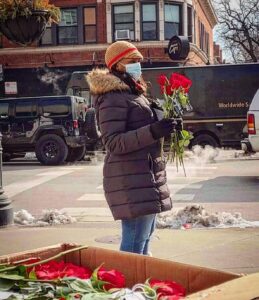(CHICAGO) — On the corner of South State Street and East 110th in Chicago’s Roseland neighborhood, blue skies and tree-lined sidewalks contrast the graying plywood of a boarded-up vacant home. Its Cape Cod-style bones, once beautiful with a stone façade and sun-filled picture windows, have been left to wither. Just one block up, another house sits with the same fate-a repeated pattern in Roseland. Homes once filled with working-class families, now sit as mocking relics of a bygone past and a neighborhood that is in desperate need of investment and opportunity.

A vacant house sits on the corner of S State Street and E 110th in Chicago’s Roseland neighborhood. [Credit: Stephany Rose Spaulding]
As a young woman growing up in Roseland, she remembers fondly a community that empowered her and provided safety. Her middle name is Rose, after all. But after leaving Roseland to embark on her own journey, Spaulding returned to find that years of economic decline, soaring house prices, and government neglect have transformed the place that helped form her identity. She is now on a mission to change all that. With her own money and retirement savings, Spaulding has begun the process of acquiring properties. Working on them as she can afford to.
It’s not the first time Spaulding has championed change. As a revered, academic, author, activist, DEI expert, politician, and founder of the Truth and Conciliation Commission, her life’s work has been dedicated to fighting for equity and justice. But accomplishments and accolades only provide a sliver of the whole story.
I first met Spaulding in the fall of 2017 as a tired and overwhelmed sociology graduate student. Struggling to finish my final semester after having my first child, Spaulding offered me a chance at a college teaching gig. It was an opportunity that would forever change my life and launch me into my future career. Since then, she has become my mentor and my friend; someone I have consistently turned to with tears of frustration, celebrations of joy, and guidance through unfamiliar territory.
But as we sat down to discuss her newest project, I was taken aback by how much I never knew about her, which I had regretfully never asked. Candidly, Spaulding opened up to me about her experiences as a Black woman navigating the world and striving for social change. Stories marked by untold labor, resilience, fear, exhaustion, and a desperate passion for wanting a better world.
It all starts, she tells me, in the neighborhood she is trying to save.
Spaulding’s parents moved into their first single-family home in Roseland when she was a baby. Their pastor, Carole Bryant, helped them purchase it. Bryant, a young Black woman with a high school diploma, knew that what parishioners and communities needed to thrive was homes. “She knew home ownership was building Black community and generational wealth,” Spaulding said passionately. “She had this wisdom, and she put it into action. That’s the kind of spirit and community I grew up in.”
As one of five siblings, Spaulding was, in her mind, the one who showed the most resistance. When I asked her older sister Angela Spaulding, she humorously said, “She was the most spoiled.” After high school, Stephany wanted to be a lawyer like the Cosby Show’s Claire Huxtable. “It was the 80s and 90s. My example of what success and a successful family look like was the Huxtables,” she said. But for Spaulding to achieve that success she needed to leave Roseland.
Spaulding was admitted to Clark Atlanta, an HBCU (historically Black college and university), where her professor encouraged her to get a doctoral degree. “I didn’t even know what a Ph.D. was,” she laughed. “I was like, Black people don’t do that. To get paid to think?”
When she learned that the United Negro College Fund and the Andrew Mellon Foundation would help her finish her undergraduate degree and get into graduate school, she jumped at the chance. She was offered a presidential scholarship to Purdue University for her graduate studies. There is, however, more to what happened next.
Purdue University sits in West Lafayette, Indiana, in a state known as a historic Ku Klux Klan stronghold. Purdue has a sprawling campus and a history dating back to the late 1800s. It exudes academic elitism. It was also where Spaulding felt open hostility for being a woman of color. “I have a bachelor’s degree in English and a master’s degree in English. I thought I would get a Ph.D. in English, but the program at Purdue was so racist and so were the professors,” she said.
But she stayed. Committed only to what she described as a God-given opportunity.
Her next step was the American Studies Program, where she continued to feel like an outsider. “Faculty in the program were not thrilled that I was there. They had responses to affirmative action. Even older graduate students would say, ‘Once you get here, they are not committed to getting you out,’” she said. “You’ve satisfied what makes them look good.”
Living in West Lafayette wasn’t easy either. During her first week, Spaulding got off at the wrong bus stop and lost her bearings. She called her mom crying, who well knew the historical attitudes toward people of color there. “My mom is on the phone, praying, horrified, and crying. All she could think about was her daughter wandering into a cornfield and getting snatched up,” she recalled. “That’s what it was like to be a Black woman in Lafayette, Indiana, in her early 20s.”
Spaulding began teaching in higher education after completing her Ph.D. in 2007. Eventually, she ended up at the University of Colorado, Colorado Springs where she served as the chair of women’s and ethnic studies, gained tenure, and was eventually appointed interim associate vice chancellor for equity, diversity, and inclusion. For a girl from Roseland, she seemed to have it all, but her most significant challenges were just ahead.
In January 2017, the world watched as Donald J. Trump was sworn in as the 45th president of the United States of America. And Spaulding was astonished. “The level of idiocy that he possessed and was able to ascend to the highest office in our nation? That’s what white male privilege looks like. He could be that idiotic, dare to run, and even win,” she said. “Meanwhile, Black women and other women of color are busting their behinds everywhere. And for me, having been through all this formal training and survival. Even proving myself as a scholar, I was like, ‘clearly, I’m not doing enough.’”
Spaulding joined hundreds of thousands at the Women’s March on Washington the day after Trump’s inauguration. Later that night, in a discussion with a friend in their hotel room, she decided to do more. “The Women’s March struck me to the core,” she said vehemently. “I didn’t want it to be just a moment; I wanted it to become something more sustainable, a movement. Nothing will change if the same types of people hold these positions. We must be the change.”
Knowing the power of political leadership, she decided to run for public office on a platform of equity and justice. But she wasn’t running for just any seat. The 5th Congressional District of Colorado is exceedingly conservative and white. Doug Lamborn had held the position since 2006 and had no plans to leave. Spaulding had to prove herself even to Democrats. “I had to work so hard just to convince them I was worthy of running for this seat,” she said. Recalling that when invited to lunch with the Democratic chair, she was asked, “Do you know you’re a Black woman in El Paso County?”
Spaulding lost that election but won almost 40% of the vote, a previously unimaginable percentage. She did what some thought she couldn’t: give a conservative white man, a career politician, a run for his money.
She wasn’t done yet though. In 2019, Spaulding ran for Colorado’s U.S. Senate seat. But she lost again. A blow that shook her resilience but didn’t knock her down.
While she was heralded across a national stage as paving the way for others and breaking barriers (even having a Ben & Jerry’s ice cream named after her), she silently hid the weight of what she carried to carve that path.
Her gender, race, and beliefs were constantly questioned. As an ally of the LGBTQ+ community, she was also a Baptist pastor. This meant she was too Christian for some and too much of an ally for others. She endured intense sexism, misogyny, and racism often with a smile. In Denver, the National Republican Senatorial Committee purchased a billboard with her face on it along with other women of color politicians, declaring Spaulding “Too Liberal for Colorado.” It was a move that Spaulding described as blatantly racist. Since no one in Colorado Springs knew how to do her hair, she drove two hours to get it done in a “presentable” way: natural hair straightened and hidden. When Black men, such as 19-year-old De’Von Bailey, were killed by police, she consoled their families and demanded law enforcement do better.
“Exhausting” was how she described her experiences, admitting to me that only other women of color can truly understand these things. “This is what it is like for Black women in America,” she said.
Spaulding received death threats in 2021 after an interview she did on Colorado Public Radio aired about the January 6th Capitol attack. An event that would make her realize just how dangerous fighting for justice can be. “I will fight white supremacy all day long, but I won’t set myself up to be killed by white people,” she said. Coupled with the unprecedented resurgence of the COVID-19 pandemic hitting the Roseland community, Spaulding knew she needed to go back. Through all her personal and professional endeavors, Roseland stayed with her. It was her lifeblood and home was calling.
Spaulding arrived back in Chicago in 2022 and embraced the political landscape once more. But a challenge to her petition paperwork removed her from the race for Chicago’s 1st Congressional District. When asked if she would ever run again, she smiled and shook her head. “I wouldn’t say 100%. I would have to have certain things in place before saying yes.”

Stephany Rose Spaulding hands out roses in Chicago’s Roseland neighborhood on Valentine’s Day, 2022. [Credit: Stephany Rose Spaulding]
Cyndi Jefferson, a former tenant of Spaulding’s, remembers the first time they met. “It felt like I knew her,” she said. Jefferson is on disability and has only one steady income from her husband. Paying Chicago’s average of $2000 a month in rent wasn’t something they could afford. When the couple inquired about how much the rent would be on their three-bedroom home that Spaulding owns, she simply asked them what they could pay. “I had to pick my mouth up off the floor,” Jefferson said. They settled on $600 a month, and for Jefferson, it meant more than just a place to call home. It meant community, someone who cares, and investment in her as a person.
In Spaulding’s eyes, this is what justice and equity look like. She strives for the next generation of Roseland youth to have the power and pride the neighborhood provided her. Something that carried her through the halls of Purdue and the streets of Lafayette. That gave her the knowledge she passed on in the classroom and in her books. Roseland taught her to make the world a better place as she faced backlash and hate. It provided the foundation that gave her the courage to face death threats and injustices, as well as the humility to keep striving even when things go wrong.
The end of a journey is often celebrated. We don’t tell stories of hidden trials, seemingly mundane things, tears shed, or disappointments. We like arrivals. But that’s not the story here. This is a snapshot of a journey in progress. For women like Spaulding, it’s the one that never gets told. “There’s a lot of resiliency, particularly that Black women have to exert to get to where the world recognizes them as history makers, but they’re making history almost every day,” she said.
And who knows what mark on history she will make next.


